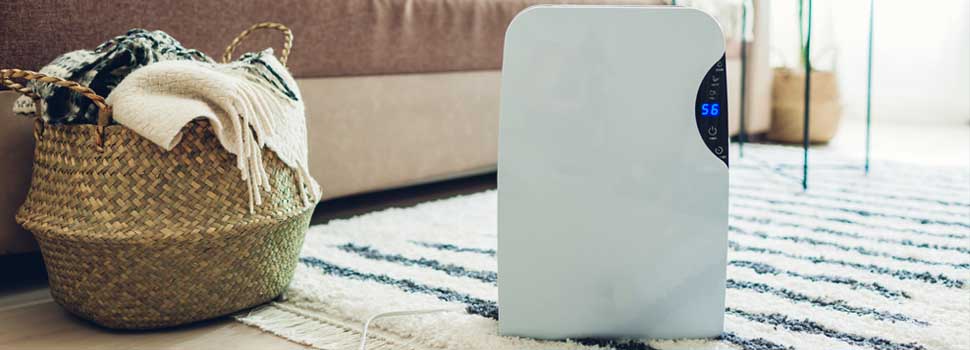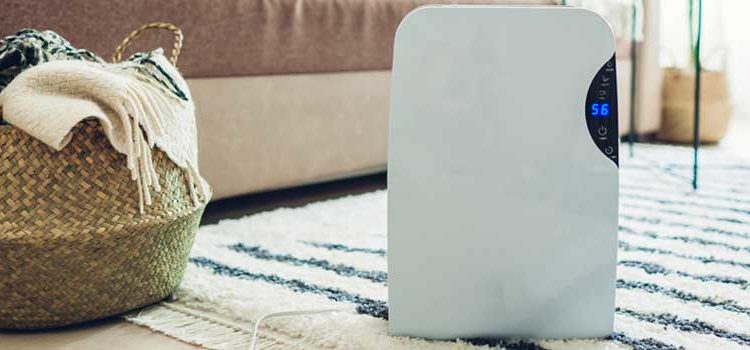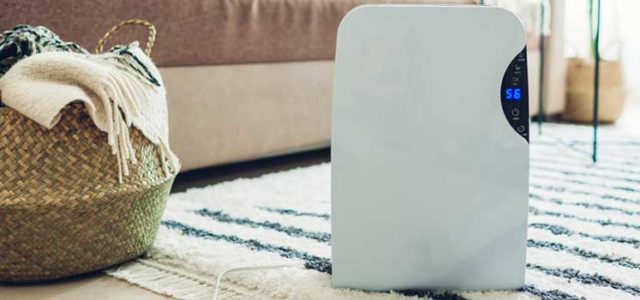


When it comes to dehumidifiers people have a lot of questions: Are they safe to leave running all the time? Can I use one to dry my washing? Are they expensive to use?
These useful household appliances seem to raise a lot of concerns and their usefulness across the home is not often well known. However, dehumidifiers have a multitude of benefits that stretch beyond simply clearing condensation from windows.
So, If you’ve just purchased a dehumidifier or are thinking of buying one you’re in the right place. In this guide, we’ll demystify the dehumidifier and answer the most burning questions people have.
1 Can i leave my dehumidifier on all night?
Yes, you can. Virtually all, but the very cheapest dehumidifiers, feature an internal hygrometer. This measures the ambient humidity level within your home. Once the humidity falls to a safe level the dehumidifier will automatically switch itself off. The dehumidifier then samples the air periodically to check if the humidity levels have risen. If they have the dehumidifier will activate again until they are lowered.
This means you don’t need to worry about spiralling energy costs or that you are wasting energy by leaving your dehumidifier running all night. They are perfectly safe to be left in this ‘automatic’ mode all day and all night.
2 Do you need to close the windows when using a dehumidifier?
Yes, you do. If your windows are left open humidity from the outside will ingress into your home to balance out the lower humidity inside. This process is known as vapour pressure.
This will cause your dehumidifier to work harder, waste energy and not effectively deal with the damp or condensation problem you are trying to eliminate.
3 Should I use a dehumidifier in the winter?
Yes, this is the time of year your home needs a dehumidifier the most. Closed windows and doors prevent excess humidity escaping from within the home.
In addition, windows and walls are colder which create the ideal cold spots for excess moisture to deposit as condensation and damp patches. This will, in turn, provide the ideal conditions for mould and bacteria to grow.
A dehumidifier will suck up excess moisture and lower the overall humidity. This makes it difficult for condensation to develop, even on cold spots, since there will be less moisture within the air. Dehumidifiers also warm the temperature of the room they are operating within (especially those dehumidifiers that use desiccant technology) lowering the need for other heat sources.
4 Where is the best place to put a dehumidifier in a house?
Usually, it is recommended to place a dehumidifier near the source of damp or condensation you are trying to remove. Ideally in the same room. However, dehumidifiers are versatile devices and it is not uncommon for them to be moved around the home as needed.
For example, after showering they can be moved into the bathroom to quickly deal with damp walls and windows. This has the added benefit of making your bathroom easier to keep clean because it is more difficult for black mould to grow in the dryer conditions a dehumidifier creates.
Some people place them in hallways and on landings so they can keep the overall humidity within the home low. This is particularly useful if your home does not suffer from a damp problem but condensation on windows.
5 Can a dehumidifier kill mould?
No, a dehumidifier cannot kill mould.
However, a dehumidifier can prevent it from growing and stop existing mould from spreading further. If you want to kill and remove existing mould you will need a mould removal kit or a mould removal spray, such as HG’s.
6 Are dehumidifiers expensive to run?
This really depends on what problem you need a dehumidifier to tackle and the kind of dehumidifier you buy. However, it is worth mentioning that as a rule of thumb dehumidifiers are NOT expensive to run for general, day-to-day use.
If your home has a severe damp problem you will need to run your dehumidifier on its highest setting for at least several hours each day in order to dry your home. In such situations using a dehumidifier will obviously cost more.
On the flip side of the coin, if you simply need a dehumidifier for general day-to-day use such as keeping a check on humidity and clearing condensation, they are very cheap to run.
It is also worth noting that kind of water removal technology a dehumidifier uses will affect its running costs. In addition, the water extraction rate of the unit also plays a role in determining running costs.
For example, the MeacoDRY ABC range uses refrigerant (also known as a compressor) technology in a low-powered unit. As such it costs as little as 2.4p an hour to run (based on 15.2p/kWh). Whereas the more powerful Zambezi dehumidifier uses desiccant technology and is a more powerful unit. As a result, its lowest running costs are around 5.3p per hour (based on 15.3p/kWh).
7 Are dehumidifiers noisy?
Modern dehumidifiers aren’t as noisy as their predecessors of previous years. In fact, dehumidifiers are becoming quieter with each new generation.
The noise a dehumidifier emits is based on 3 key points:
- The first is the type of dehumidifier you are using. Typically refrigerant dehumidifiers are the noisiest (although more recent models are becoming quieter). The quietest dehumidifiers are those which use Peltier or desiccant technology.
- The second is the mode your dehumidifier is operating in. A more powerful mode means a higher fan speed and the noisier your dehumidifier will be.
- Lastly is where your dehumidifier is operating. Running in your bedroom during the quiet of night a dehumidifier will obviously appear to be relatively noisy. But, that same dehumidifier running in your kitchen or hallway during the day will be fade into the background as you go about your daily business.
You can expect a dehumidifier to emit anywhere from 34dB (equivalent to people whispering) to 45-50dB (equivalent to normal conversation).
8 Are dehumidifiers safe?
Yes, in fact dehumidifiers can help improve the overall quality of the air within your home. But before we move into their benefits, first let’s look at the main reason people might think of dehumidifiers as unsafe: over-drying.
Whilst it is true you can over-dry your home, which leads to problems such as dry, sore throats and cracked lips, it is difficult to do this with dehumidifiers that feature a hygrometer.
Remember, you are responsible for setting the target humidity threshold a dehumidifier will work towards and you can raise this minimum level at anytime. In addition, many dehumidifiers feature over-drying protection systems and will never lower the relative humidity below 40-45% (this is considered the safe minimal level within the home).
Now for the good stuff! How they can help improve the air quality within your home. To begin with, some premium dehumidifiers are furnished with an ionizer. Ionizers are known for their ability to improve the air quality within homes by clearing the air or dust and fine dirt.
Secondly, it is not uncommon for dehumidifiers to feature antibacterial functions. This means as they pull in air from your home any bacteria or mould spores that are sucked in too are killed. The end result of this process is that the air exiting the machine is cleaner and virtually bacteria-free.
Lastly, a dehumidifier will help improve how easy it is to heat your home because dryer air is easier to heat than damp air.
9 Do dehumidifiers stop damp?
This depends on the kind of damp you are experiencing in your home. Damp patches caused by high humidity and condensation will be stopped by a dehumidifier. However, if you home has a more serious damp issue, such a penetrating damp, a dehumidifier will help keep it a bay, but not cure it. This is because you a not treating the underlying cause of the damp problem.
10 Are dehumidifiers bad for you?
No, they are not. Dehumidifiers do not emit any harmful contaminants nor do they damage your home or your health. As mentioned in an earlier point it is possible to over-dry your home slightly using a dehumidifier however, you are in control of the target humidity level the dehumidifier aims to reach. We suspect the idea that a dehumidifier could be harmful stems from concerns regarding over-drying.
11 Are dehumidifiers supposed to blow out warm air?
Yes, they are. This is a by-product of how a dehumidifier removes moisture from the air. Generally, a dehumidifier will blow our air that is 1.5 – 2°C warmer than the ambient room temperature. Over time this means a dehumidifier will warm the space it is operating within.
This is especially true for desiccant dehumidifiers because they use a small heating system to dry, and therefore remove moisture, from a highly absorbent material called zeolite. As a result, the air they blow out is much warmer than that emitted from other dehumidifiers.
As a footnote, it is worth mentioning that zeolite is a 100% natural and safe material.
12 Can i drink water from a dehumidifier?
No, this is not recommended. This is not because anything within a dehumidifier is materially harmful. But rather the collected water can pick up impurities and dirt as it passes through the inner workings of the dehumidifier. So, whilst it might tempting to pour it into your kettle to make your next brew, we wouldn’t recommend it.
That said, whilst people do not drink it, many use it to water plants in their home or garden opposed to simply tipping it away.
13 Can I use a dehumidifier to dry my washing?
Yes, you can. Many dehumidifiers even feature a specific mode to do just that. Often referred to as ‘laundry mode’ this setting causes the dehumidifier to run at its highest setting. This helps quickly dry clothes and many people now use a dehumidifier to dry their washing indoors opposed to using a tumble dryer which obviously costs a lot more to run.
As an added bonus, the heat generated by a dehumidifier is not wasted and is returned to the room in the form of warm dry air. This lowers the need for separate heat sources within the room the dehumidifier is operating within.
14 Are dehumidifiers expensive?
You can choose from a wide range of dehumidifiers to suit any need and budget. Some of the least powerful dehumidifiers start at as little as £40. And some of the most expensive ones can cost as much as £300.
The only caveat with the cheaper dehumidifiers is that a reduction in price usually means a reduction in performance, build quality and useful additional features. And, with the exception of some top-end units, many people won’t need to spend above £200 a dehumidifier for general use.
As a rule of thumb, we recommend buying a dehumidifier in the £100 – £200 bracket to ensure you get a unit that is reliable, performs well and has enough features to be useful across the home.
15 Are bathroom dehumidifiers good?
Whilst there are a few dehumidifiers made to be permanently mounted on a bathroom wall, such as the EcoAir DCW10, a portable dehumidifier will help within your bathroom.
Aside from the kitchen, the bathroom is the room of the house we create the most moisture within. This excess moisture will deposit as condensation on the bathroom walls and windows. In addition, this moisture will also spread across the home increasing the chance of condensation and damp spots.
The end result of this is that black mould and a pink bacteria called Serratia marcescens are likely to thrive in your bathroom. Growing on wall surfaces, ceiling and grout.
But, by eliminating moisture as it develops you can help prevent this from happening. A dehumidifier will quickly dry out your bathroom after showering and lower the humidity to a level that mould cannot grow within.





